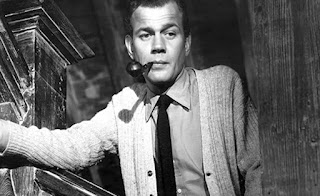Directed by William Dieterle; produced by Hal B Wallis
Fighting in World War Two, Captain Alan Quinton (Joseph Cotten) finds the time to write love letters for his fellow officer, Roger Morland (Robert Sully). The trouble with this Cyrano-like situation is that Morland is a cad, and Quinton has fallen in love with his correspondent, Victoria, a woman living in England. When the war ends, Quinton learns that Morland has died and Victoria has vanished. Quinton tries to forget both of them when he falls in love with a mysterious stranger (Jennifer Jones). But he discovers that no one can escape their past entirely, especially when they didn’t know they had one.
Cotten appeared in four movies with Jones, in two of which they were romantically paired. Interestingly, in both of these, Jones’s character lends an ethereal quality to the production. Though this is more the case in Portrait of Jenny, Love Letters also has elements of the otherworldly; there is nothing supernatural about the story, but it does capture a kind of surrealism in its depiction of a disturbing amnesia.
Despite the title, which would have gone well with a Bing Crosby or Fred Astaire musical, Love Letters is a melodramatic mystery. It is adapted from a novel by Chris Massie, with a screenplay by Ayn Rand. It would be interesting to compare the two, and see how much of the dialogue comes from the latter. The words have a feel of the stage to them, and they don’t comprise very realistic dialogue. It is the kind of script in which everyone is lf-poetic, and very mysterious, without having to be, and in which people say things that sound cleverer than they really are.
Even for this quality, which may be considered contrivance, there is a lyrical element to the dialogue that works. As an example, Jones has a particularly good speech during a trial, when she talks of how everyone waits for something “great and wonderful” in their lives. Love Letters, as typified in the dialogue, is one of those movies that seems to take place in a world just a bit removed from the everyday. This isn’t John Osborne, after all.
The acting is very good, though there is a problem with Cotten’s performance in that, while Quinton is an Englishman, he has no kind of English accent. Neither does Sully, whose character serves in Cotten’s regiment; nor does Byron Barr, who portrays Cotten’s brother. Their characters’ parents, however, are clearly English. As with Franchot Tone’s similarly flawed performance in the recently reviewed Five Graves to Cairo, this problem is rather quickly forgotten. However, why Cotten could not have been made a Canadian (Canada’s troops took a prominent part in the fighting in Italy, where Quinton serves), I’ve no idea. This device was commonly used when placing an American actor in British settings (eg. Gary Cooper in The Lives of a Bengal Lancer).
Aside from that minor bump (Cotten himself said that he “couldn’t do any accents”), Cotten gives one of his best performances in Love Letters. He convincingly plays a man who is both cynical and hopeful, and his change when he inherits a relative’s property in rural Essex is smoothly achieved. He reveals much by his reaction to finding mementos of his childhood. (That’s Cotton as a boy in the old photograph.)
The other roles are filled very well. Jones is suitably childlike as the woman without a past, who is content not having one, due to the fears she has of remembering. Sully, in a small but important part, makes his character rather despicable through his apathy and selfishness. Anne Richards, as Quinton’s friend, gives an understated presentation; this actress, also a poetess, had a short cinematic career, usually in supporting roles. She was originally marked to play the lead in Love Letters, which would have made quite a different movie.
The direction is satisfying. Particularly well handled are the scenes in the country, after Quinton moves into his inherited house. Though undoubtedly a set, the performances and the direction give it a reality. Also, the mystery of Jones’s character, and the knowledge others have of her, is provided a suspense that is quiet, almost in the background. This creates an effective feeling of something ominous in the offing.
While definitely too melodramatic for some tastes, and too florid for others, the solid acting of Cotten keeps Love Letters grounded, making an entertaining and slightly fantastical movie.









Apparently, Ayn Rand *hated* the novel that was the inspiration for the film, and basically chucked it into the trash before she wrote the script. I take it that the book and the film are completely different fish.
ReplyDeleteI suspect you're right. I wonder why she took on the job of adapting it.
DeleteI wonder if, in 1945, the movie goers were looking for some bit of escape with the war near an end. Though I suspect when this movie was made, no one knew how soon that would be.
ReplyDeleteUndoubtedly, you are right. Certainly, a great many movies were made which, while featuring veterans or others in uniform, did not centre on the war; thinking beyond it - or imagining beyond it - was important to many. And "Love Letters" was released in October, 1945, so, while it was likely made in the last months of the conflict, the war was over by the time it was released. The story could have been about Cotten after he had been demobilised due to wounds (and the war still on), or could have taken place after peace had come. That may have been a conscious part of the movie-making.
Delete